新概念英语2 语法专题——情态动词、倒装句和反意疑问句 课件(共42张PPT)
文档属性
| 名称 | 新概念英语2 语法专题——情态动词、倒装句和反意疑问句 课件(共42张PPT) | 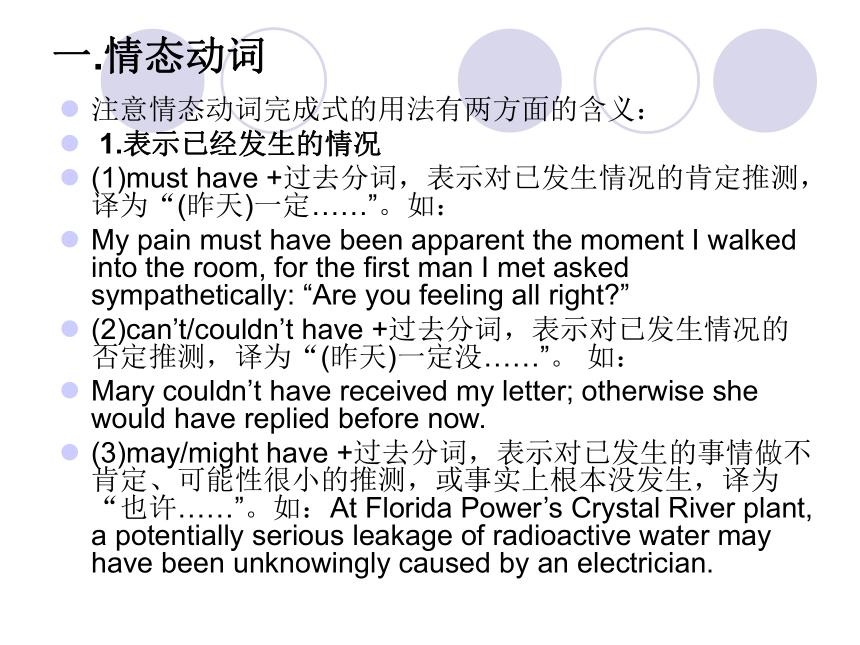 | |
| 格式 | zip | ||
| 文件大小 | 250.0KB | ||
| 资源类型 | 教案 | ||
| 版本资源 | 新概念英语 | ||
| 科目 | 英语 | ||
| 更新时间 | 2023-02-16 17:26:46 | ||
图片预览

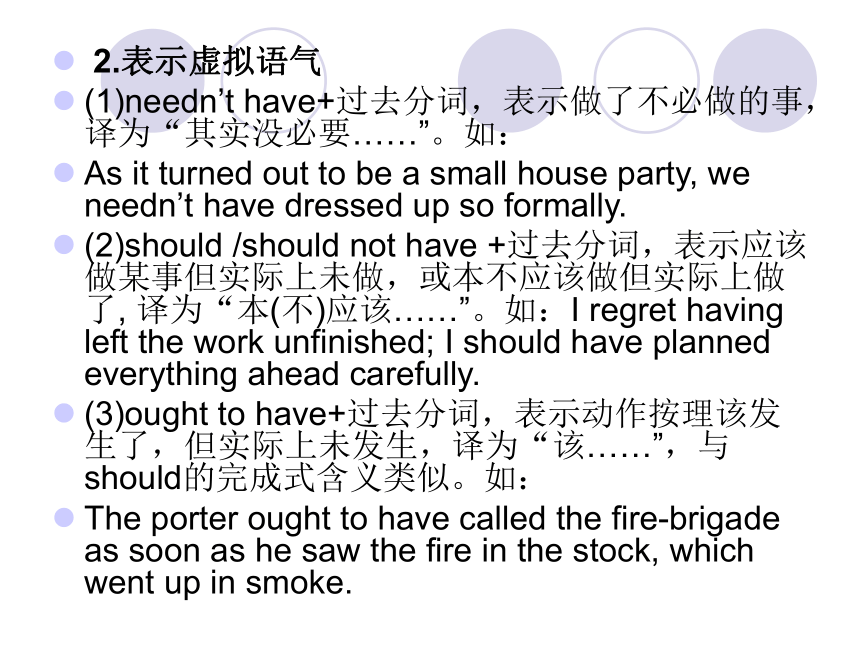
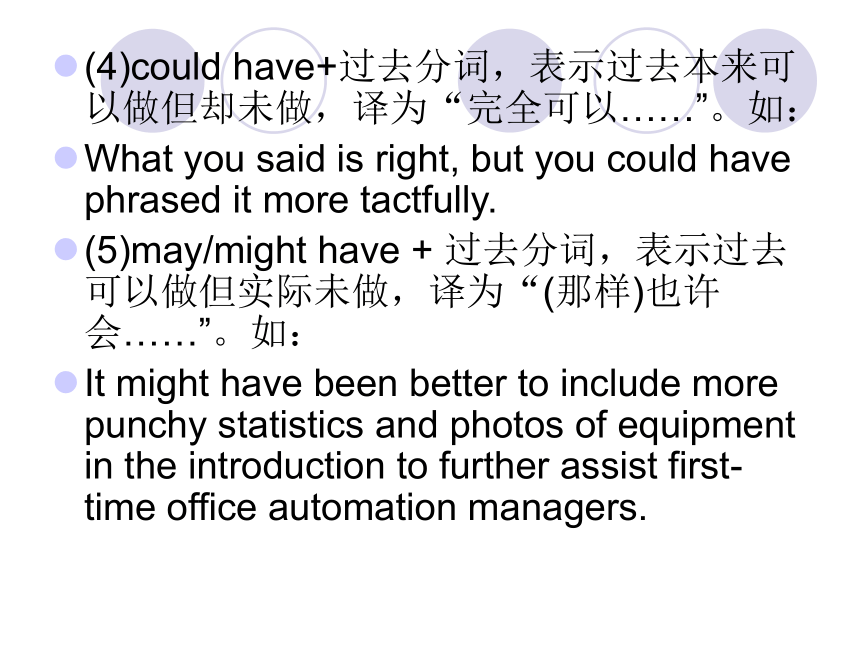
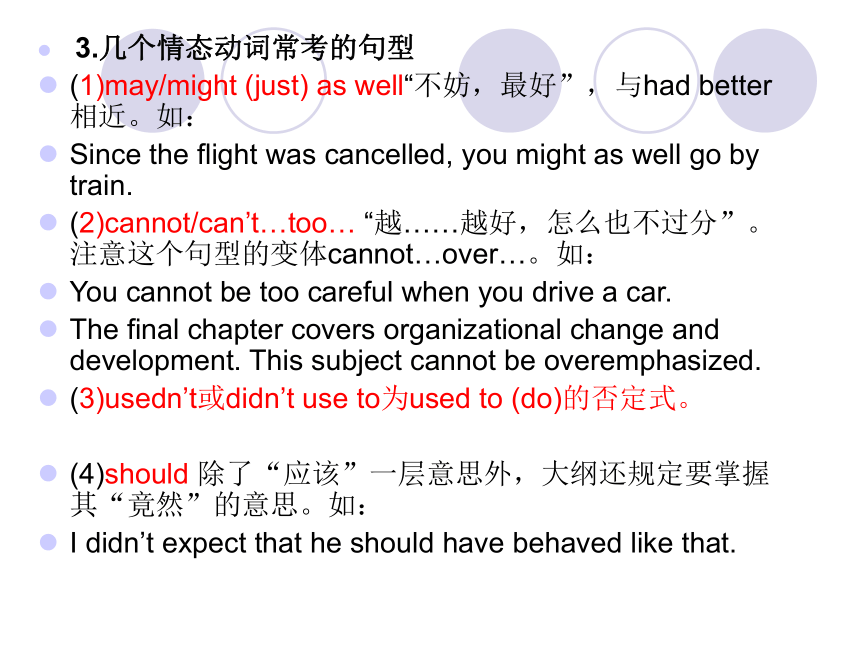
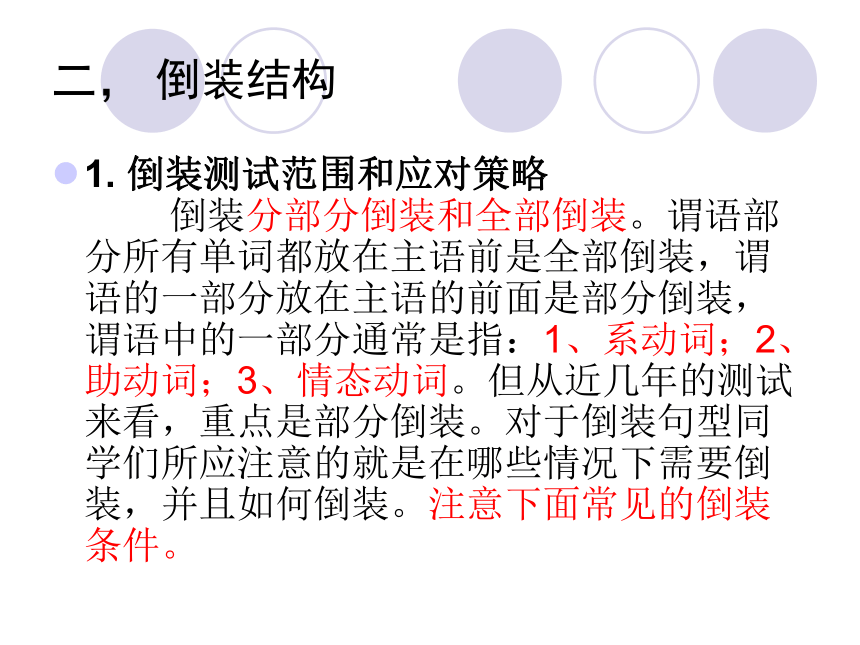
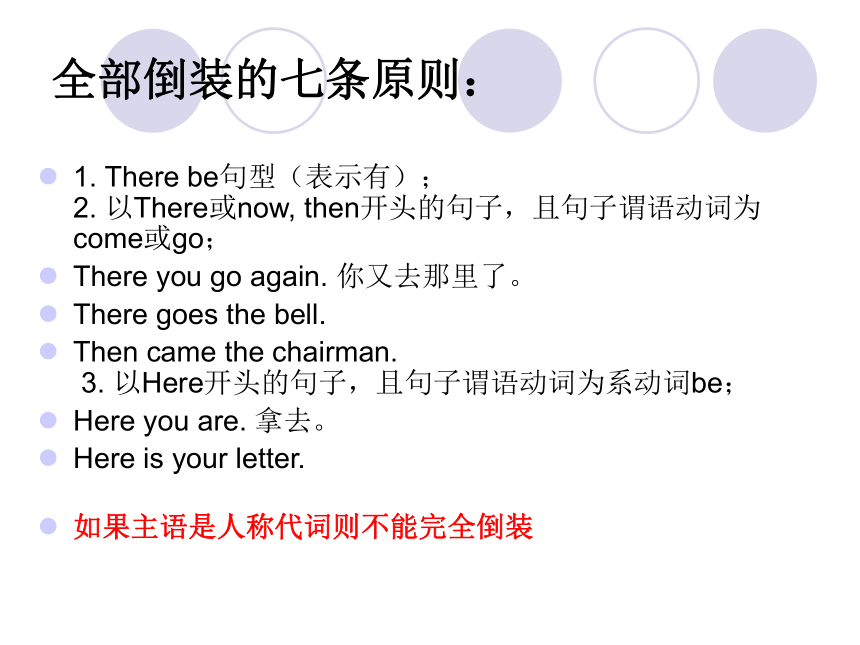
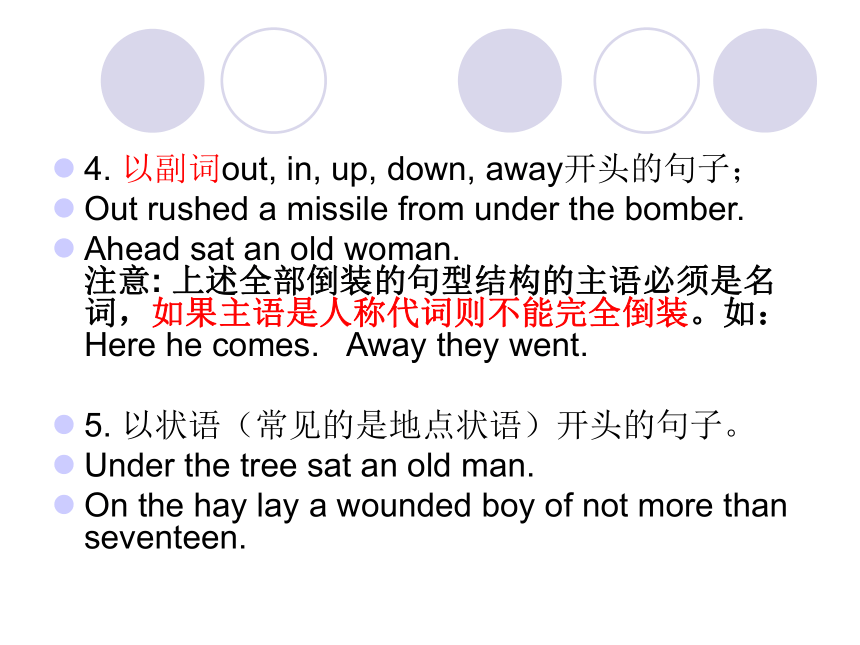
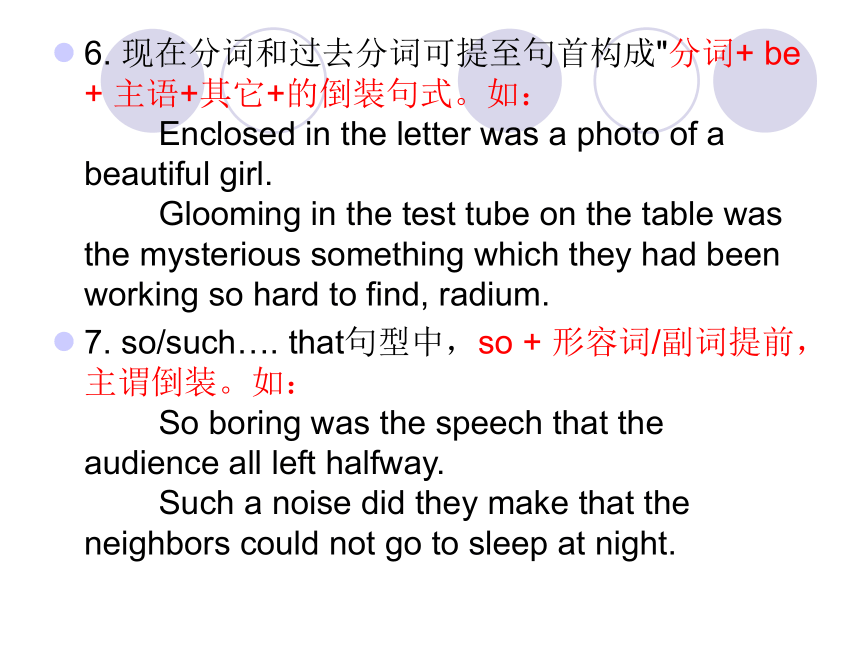
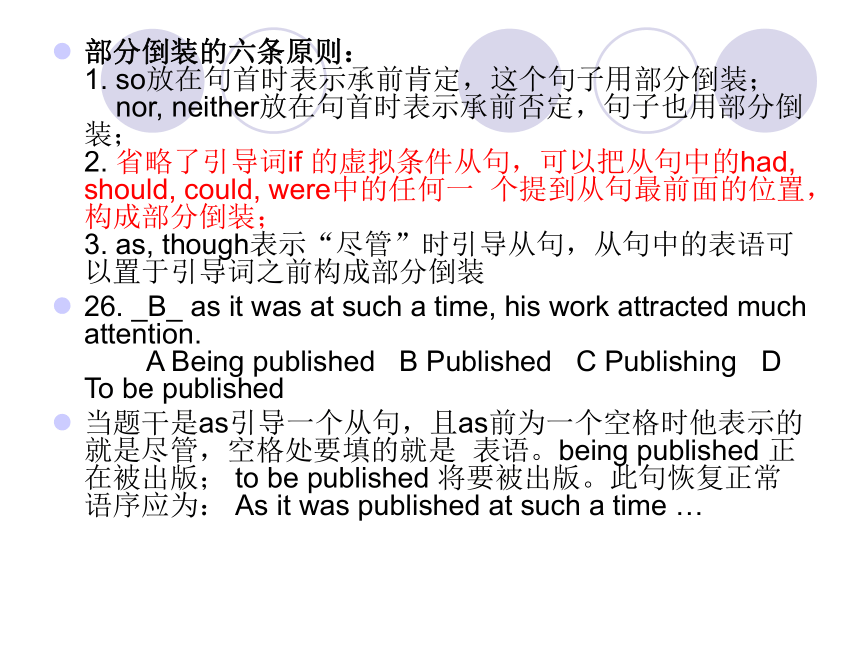
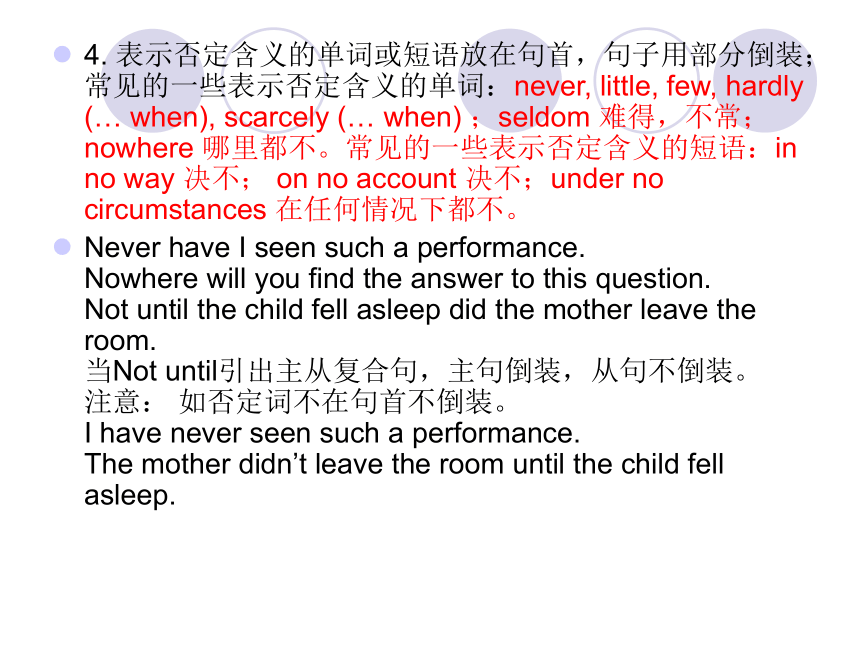
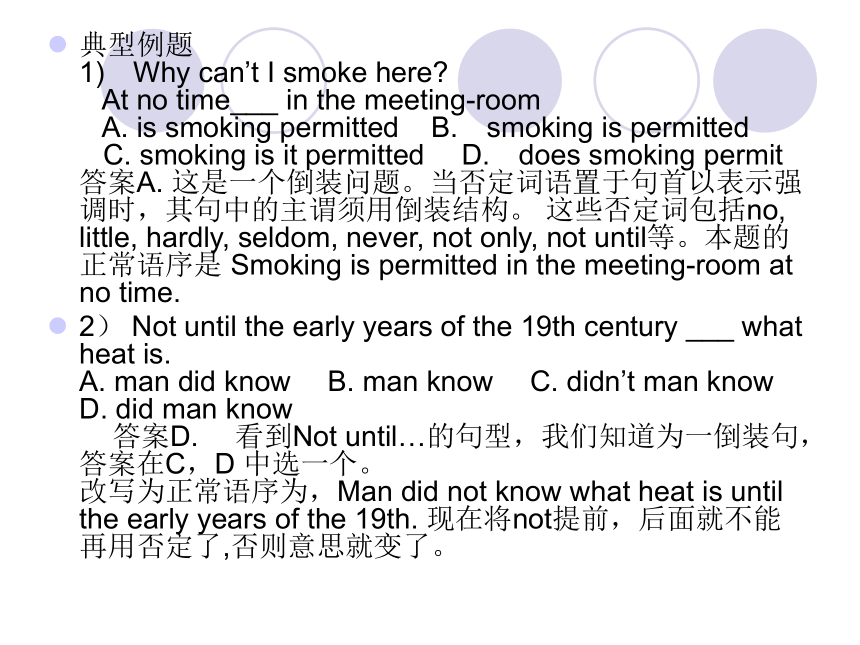
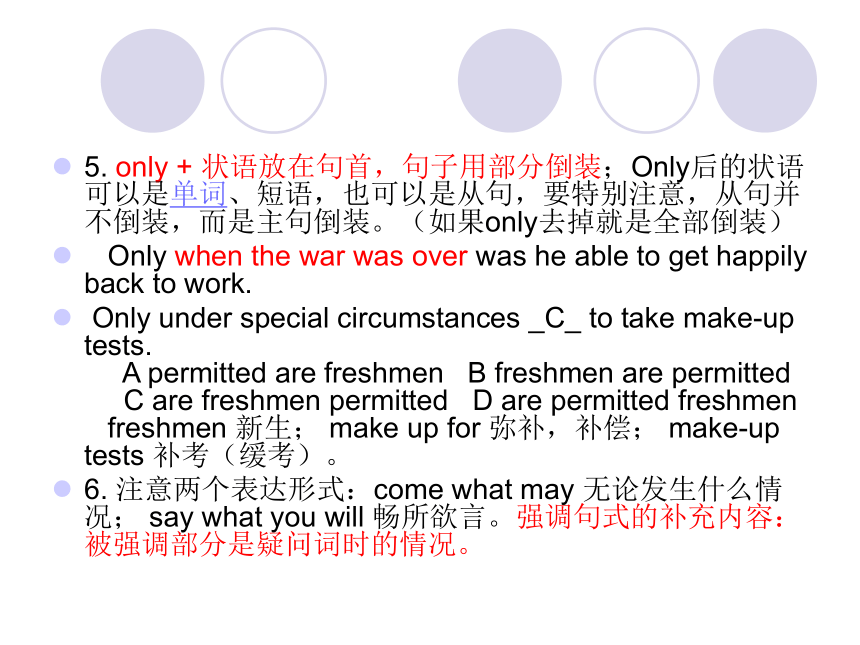
文档简介
(共42张PPT)
一.情态动词
注意情态动词完成式的用法有两方面的含义:
1.表示已经发生的情况
(1)must have +过去分词,表示对已发生情况的肯定推测,译为“(昨天)一定……”。如:
My pain must have been apparent the moment I walked into the room, for the first man I met asked sympathetically: “Are you feeling all right ”
(2)can’t/couldn’t have +过去分词,表示对已发生情况的否定推测,译为“(昨天)一定没……”。 如:
Mary couldn’t have received my letter; otherwise she would have replied before now.
(3)may/might have +过去分词,表示对已发生的事情做不肯定、可能性很小的推测,或事实上根本没发生,译为“也许……”。如:At Florida Power’s Crystal River plant, a potentially serious leakage of radioactive water may have been unknowingly caused by an electrician.
2.表示虚拟语气
(1)needn’t have+过去分词,表示做了不必做的事,译为“其实没必要……”。如:
As it turned out to be a small house party, we needn’t have dressed up so formally.
(2)should /should not have +过去分词,表示应该做某事但实际上未做,或本不应该做但实际上做了, 译为“本(不)应该……”。如:I regret having left the work unfinished; I should have planned everything ahead carefully.
(3)ought to have+过去分词,表示动作按理该发生了,但实际上未发生,译为“该……”,与should的完成式含义类似。如:
The porter ought to have called the fire-brigade as soon as he saw the fire in the stock, which went up in smoke.
(4)could have+过去分词,表示过去本来可以做但却未做,译为“完全可以……”。如:
What you said is right, but you could have phrased it more tactfully.
(5)may/might have + 过去分词,表示过去可以做但实际未做,译为“(那样)也许会……”。如:
It might have been better to include more punchy statistics and photos of equipment in the introduction to further assist first-time office automation managers.
3.几个情态动词常考的句型
(1)may/might (just) as well“不妨,最好”,与had better相近。如:
Since the flight was cancelled, you might as well go by train.
(2)cannot/can’t…too… “越……越好,怎么也不过分”。注意这个句型的变体cannot…over…。如:
You cannot be too careful when you drive a car.
The final chapter covers organizational change and development. This subject cannot be overemphasized.
(3)usedn’t或didn’t use to为used to (do)的否定式。
(4)should 除了“应该”一层意思外,大纲还规定要掌握其“竟然”的意思。如:
I didn’t expect that he should have behaved like that.
二, 倒装结构
1. 倒装测试范围和应对策略 倒装分部分倒装和全部倒装。谓语部分所有单词都放在主语前是全部倒装,谓语的一部分放在主语的前面是部分倒装,谓语中的一部分通常是指:1、系动词;2、助动词;3、情态动词。但从近几年的测试来看,重点是部分倒装。对于倒装句型同学们所应注意的就是在哪些情况下需要倒装,并且如何倒装。注意下面常见的倒装条件。
全部倒装的七条原则:
1. There be句型(表示有); 2. 以There或now, then开头的句子,且句子谓语动词为come或go;
There you go again. 你又去那里了。
There goes the bell.
Then came the chairman. 3. 以Here开头的句子,且句子谓语动词为系动词be;
Here you are. 拿去。
Here is your letter.
如果主语是人称代词则不能完全倒装
4. 以副词out, in, up, down, away开头的句子;
Out rushed a missile from under the bomber.
Ahead sat an old woman. 注意: 上述全部倒装的句型结构的主语必须是名词,如果主语是人称代词则不能完全倒装。如:Here he comes. Away they went.
5. 以状语(常见的是地点状语)开头的句子。
Under the tree sat an old man.
On the hay lay a wounded boy of not more than seventeen.
6. 现在分词和过去分词可提至句首构成"分词+ be + 主语+其它+的倒装句式。如: Enclosed in the letter was a photo of a beautiful girl. Glooming in the test tube on the table was the mysterious something which they had been working so hard to find, radium.
7. so/such…. that句型中,so + 形容词/副词提前,主谓倒装。如: So boring was the speech that the audience all left halfway. Such a noise did they make that the neighbors could not go to sleep at night.
部分倒装的六条原则: 1. so放在句首时表示承前肯定,这个句子用部分倒装; nor, neither放在句首时表示承前否定,句子也用部分倒装; 2. 省略了引导词if 的虚拟条件从句,可以把从句中的had, should, could, were中的任何一 个提到从句最前面的位置,构成部分倒装; 3. as, though表示“尽管”时引导从句,从句中的表语可以置于引导词之前构成部分倒装
26. _B_ as it was at such a time, his work attracted much attention. A Being published B Published C Publishing D To be published
当题干是as引导一个从句,且as前为一个空格时他表示的就是尽管,空格处要填的就是 表语。being published 正在被出版; to be published 将要被出版。此句恢复正常语序应为: As it was published at such a time …
4. 表示否定含义的单词或短语放在句首,句子用部分倒装;常见的一些表示否定含义的单词:never, little, few, hardly (… when), scarcely (… when) ;seldom 难得,不常;nowhere 哪里都不。常见的一些表示否定含义的短语:in no way 决不; on no account 决不;under no circumstances 在任何情况下都不。
Never have I seen such a performance. Nowhere will you find the answer to this question. Not until the child fell asleep did the mother leave the room. 当Not until引出主从复合句,主句倒装,从句不倒装。 注意: 如否定词不在句首不倒装。 I have never seen such a performance. The mother didn’t leave the room until the child fell asleep.
典型例题 1) Why can’t I smoke here At no time___ in the meeting-room A. is smoking permitted B. smoking is permitted C. smoking is it permitted D. does smoking permit 答案A. 这是一个倒装问题。当否定词语置于句首以表示强调时,其句中的主谓须用倒装结构。 这些否定词包括no, little, hardly, seldom, never, not only, not until等。本题的正常语序是 Smoking is permitted in the meeting-room at no time.
2) Not until the early years of the 19th century ___ what heat is. A. man did know B. man know C. didn’t man know D. did man know 答案D. 看到Not until…的句型,我们知道为一倒装句,答案在C,D 中选一个。 改写为正常语序为,Man did not know what heat is until the early years of the 19th. 现在将not提前,后面就不能再用否定了,否则意思就变了。
5. only + 状语放在句首,句子用部分倒装;Only后的状语可以是单词、短语,也可以是从句,要特别注意,从句并不倒装,而是主句倒装。(如果only去掉就是全部倒装)
Only when the war was over was he able to get happily back to work.
Only under special circumstances _C_ to take make-up tests. A permitted are freshmen B freshmen are permitted C are freshmen permitted D are permitted freshmen freshmen 新生; make up for 弥补,补偿; make-up tests 补考(缓考)。
6. 注意两个表达形式:come what may 无论发生什么情况; say what you will 畅所欲言。强调句式的补充内容:被强调部分是疑问词时的情况。
7..让步从句的倒装
(1)as引导让步状语从句,必须采用倒装结构,但不是主谓倒装,而是将被强调的内容置于句首。如:
Much as I have traveled, I have never seen anyone to equal her, in thoroughness, whatever the job.
(2)出现在句型be+主语+其他, come what may中。如:
Our civilization has accumulated an incredible amount of knowledge—be it scientific or artistic.
The business of each day, be it selling goods or shipping them, went quite smoothly.
Come what may, I’ll be on your side.
8.比较从句的倒装
as, than引导的比较从句中,如果主语是名词短语且较长,经常采用倒装结构(不倒装也可以)。注意:这种结构主语一般为名词,如果是代词则不倒装。如:
Hydrogen burns much more cleanly than do other fuels and is easy to produce.
Reading is to the mind as is exercise to the body.
三,反义疑问句
㈠反意疑问句的结构形式: 反意疑问句提出情况或看法,问对方同不同意,这种问句都由两部分组成,前一部分用陈述句的形式,后一部分是一个附着在前一部分上的简短问句,中间用逗号隔开,如前一部分为肯定形式,后一部分通常用否定形式,前一部分为否定形式,后一部分就用肯定形式,两部分的时态要一致。如: ①You are to go home via Hongkong, aren’t you 你准备经香港回国,对吧?(肯定的陈述句+否定的反意疑问句) ②They didn’t raise many questions at the press conference, did they 他们在记者招待会上没提出很多问题,是吧?(否定的陈述句+肯定的反意疑问句) ③You won’t be away for long, will you 你不会离开太久,是吧?(否定的陈述句+肯定的反意疑问句) ④You have already got our invitation, haven’t you 你们已收到了我们的请贴,是吧?(肯定的陈述句+否定的反意疑问句)
㈡反意疑问句的答语 在回答反意疑问句时,应根据事实来回答,如果事实是肯定的,前面要用yes,否则用no, 在第一部分为否定句时要特别注意,这时英语回答和汉语回答是不一致的。
如: ----You are not going out today, are you 你今天不出去,是吗? ----No, I am not. 是的,我今天不出去。
(“不出去”属于否定的事实,所以在英语中应用“no”来表示此义,不要用 “yes” 来回答。) ---George wasn’t there that day, was he 乔治那天不在那里,对吧? ----No, he wasn’t. 对,他不在。 (“不在”属于否定的事实,所以在英语中应用“no”来表示此义,不要用 “yes”来回答。)
㈢构成反意疑问句时应注意的问题:
⒈当陈述部分的主语是everybody, everyone, someone, no one, nobody, somebody等不定代词时,反意疑问句部分中的主语常用they (有时也可用he.)如: ①Nobody phoned while I was out, did they 我出去的时候没人打电话,是吧? ②Everyone has been there, haven’t they 每个人都去过那里,是吗? ③Somebody borrowed my pen yesterday, didn’t they 昨天有人借了我的钢笔,是吧? ④No one was hurt, was he 没人受伤,是吧?
⒉ 当陈述部分的主语是everything, anything, nothing, something等表物的不定代词时,反意疑问部分的主语常用it.如: ① Everything has been done on how to prevent the pollution, hasn’t it 关于如何预防污染已采取了一切措施,是吗? ②Nothing is wrong with the machine, is it 这台机器没出什么毛病,是吧? ③Nothing can stop us now, can it 任何事情都无法阻止我们,是吧?
⒊ 当陈述部分的主语是one时,反意疑问部分的主语常用one或you。如: ①One can’t be too careful, can one/ you 一个人越认真越好,是吧? ②One should study hard, shouldn’t one/ you 一个人应当认真学习,是吗?
⒋ 当陈述部分的主语是man(人类)时,反意疑问部分的主语常用he。如: Man is the master of his own fate, isn’t he 人类是自己命运的主宰,是吗?
⒌ 当陈述部分是there be结构时, 反意疑问部分用there,省略主语代词。 如: ①There is something wrong with the machine, is there 机器出了毛病了,是吗? ②There won’t be any trouble, will there 不会有任何麻烦,是吗? ③There used to be a shop, didn’t there
⒍ 当陈述部分含有seldom, hardly, never, rarely, few, little, nowhere, nothing等否定词或半否定词时,反意疑问部分的动词应用肯定形式。如: ①She seldom goes to the cinema, does she 她很少去看电影,是吗? ②Few people know him, do they 没几个人认识他,是吗? ③Bob rarely got drunk, did he 鲍勃很少喝醉,是吗? ④He has never been to London, has he 他从没去过伦敦,是吗? ⑤They can hardly understand it, can they 他们几乎不能理解,是吗? ⑥You have nothing else to say, have you 你没有什么可说的了,是吧?
⒎ 当陈述部分中含有im, in, dis, un等否定前缀或less等否定后缀时,应把陈述部分看成是肯定的,反意疑问部分要用否定式。如: ①He was unsuccessful, wasn’t he 他没成功,是吗? ②This meeting is unimportant, isn’t it 这次会议不重要,是吗? ③Your mother dislikes seeing you with me, doesn’t she 你母亲不喜欢看到你和我在一起,是吗? ④He is unfamiliar with this type of computer, isn’t he 他不熟悉这种类型的计算机,是吗?
⒏ 当陈述部分是I’m …结构时,反意疑问部分常用aren’t I 如: ①I am late, aren’t I 我迟到了,是吗? ②I’m a boy, aren’t I 我是一个男孩,是吗? ⒐ 当陈述部分是主从复合句时,反意疑问部分中的动词和主语代词通常应和主句中的动词和主语保持一致。如: ①She says that I did it, doesn’t she 她说是我做的,是吗? ②He never said he would come, did he 他从没说过要来,是吗? ③When he goes there, he will go to see her, won’t he 当他去那里时,他要去看她,是吗? ④If you don’t start early, you will be late, won’t you 如果你不早点出发就会迟到,是吗? ⑤He told you that he had watched the football match, didn’t he 他告诉你已看过了这场足球赛,是吗? ⑥Peter believes that his dream will come true some day, doesn’t he 彼得相信有一天他的梦想会实现,是吗?
⒑ 当陈述部分的主句是I suppose, I think, I believe, I imagine等结构时,反意疑问部分往往与从句保持一致,而且要注意否定转移。如: ①I suppose that she is careful, isn’t she 我认为她认真,是吗? ②I think he is a thief, isn’t he 我认为他是一个小偷,是吗? ③I don’t believe she has gone home, has she 我认为她没有回家,是吗? ④I don’t think he can do it well, can he 我认为他做不好那件事,是吗? ⑤I don’t believe you can finish the job, can you 我觉得你完不成这项工作,是吗? ⑥I don’t guess he knows it, does he 我想他不知道这件事,是吗?
⒒ 当陈述部分含有have,而且have作“有”解时,反意疑问部分用have/has或借助助动词do, does, did等来完成;如果陈述部分中的have是实义动词,则反意疑问部分应需借助助动词do, does, did等来完成。如: ①He hasn’t a lot of time to spare, has he 他没有许多可以抽出的时间,是吗? ②He doesn’t have an English dictionary, does he 他没有英语词典,是吗? ③They had milk and bread for breakfast, didn’t they 他们早餐吃的面包喝的牛奶,是吗? ④You all had a good time, didn’t you 你们都玩儿得很开心,是吗? ⑤Mike often has a cold, doesn’t he 迈克经常感冒,是吗
⒓当陈述部分的谓语动词包括have to, had to时,反意疑问部分通常用do的适当形式。如: ①You had to take the early bus, didn’t you 你不得不乘坐早班车,是吗? ②We have to do it, don’t we 我们不得不做这件事,是吗? ③He has to look after the child, doesn’t he 他不得不照顾这个小孩,是吗? ④They had to keep quiet, didn’t they 他们不得不保持安静,是吗?
⒔ 当陈述部分含有情态动词used to时,反意疑问部分可用used to形式或did形式。如: ①He used to smoke three cigarettes a day, didn’t/ usedn’t he 他过去一天常吸三根香烟,是吗? ②He used to get up late, didn’t/ usedn’t he 他过去起床晚,是吗?
③We used to work in the same workshop, didn’t/ usedn’t we
我们过去在同一个车间工作,是吗?
⒕ 当陈述部分是祈使句时,反意疑问部分常用will you. 如: ①Help me to do it, will you 帮我做这件事,好吗? ②Don’t go there, will you 别去那里,好吗? ③Be quiet, will you 安静些,好吗? ④Give me some cigarettes, will you 给我一些香烟,好吗? ⑤Don’t move the chair, will you 别搬这把椅子,好吗? ◆ Let’s 和Let us都表示“让我们”,但用法上不同。前者包括听话人,后者不包括听话人。正因如此,它们的反意疑问句的形式常常不同: 以Let’s 开头的祈使句,反意疑问部分常用shall we. 以Let us开头的祈使句,反意疑问部分常用will you. 如: ①Let’s go skating, shall we 我们去滑冰,好吗?(说话人、听话人均去滑冰) ②Let us have a look at your book, will you 让我们看看你的书,好吗?(说话人要看书,听话人不看书)
⒖ 当陈述句部分含had better/best, would like to, would rather等约定俗成特殊短语时,反意疑问部分应保留第一个词。如: ①He had better do more speaking, hadn’t he 他最好多说,是吗? ②You would like to do it, wouldn’t you 你愿意做这件事,是吗? ⒗ 当陈述句部分是强调句或类似强调句的结构时,反意疑问部分常和句首的It is/was保持一致。如: ①It was in a park that you met him, wasn’t it 你是在公园里遇见了他,是吗? ②It is the first time that he has gone there, isn’t it 这是他第一次去那里,是吗? ③It is ten years since he joined the army, isn’t it 他参军十年了,是吗?
⒘ 当陈述句部分为感叹句时,反意疑问句部分常用否定形式,且问句部分的动词常用be. 如: ①What a handsome man he is, isn’t he 他是一个多么英俊的人,是吗? ②What a cold day, isn’t it 多么冷的一天,是吗? ⒙ 当陈述部分含有情态动词must, may, can’t, 且表示推测时,反意疑问部分不能用must, may, can’t自身,应和后面的实义动词保持一致;
◆ must/ may/ can’t + do 表示对现在情况的推测,反意疑问部分用一般现在时。 如: ①He must be Mr. Chen, isn’t he (相当于:I think he is Mr. Chen.) 他一定是陈先生,是吗? ②He can’t be Mr. Chen, is he (相当于I don’t think he is Mr. Chen.) 他不可能是陈先生,是吗? ③He must be very tired, isn’t he (相当于:I believe he is very
◆ must/ may/ can’t + have done +过去时间状语,表示对过去情况的推测,反意疑问部分常用一般过去时。如: ①He must have stayed at home yesterday, didn’t he (相当于: I think he stayed at home yesterday.) 他昨天一定呆在家里了,是吗? ②You must have seen the film last week, didn’t you (相当于:I think you saw the film last week.) 你上周一定看这部影片了,是吗?
◆ must/ may/ can’t + have done , 反意疑问部分常用现在完成时。如: ①You must have met him before, haven’t you (相当于:I think you have met him before.)你从前一定见过他,是吗? ②You may have been to Tibet, haven’t you (相当于:Maybe you have been to Tibet.) 你可能去过西藏,是吗? ③He can’t have known the news, has he (相当于:I don’t think he has known the news.) 他不可能知道那个消息了,是吗? ④You must have waited for a long time, haven’t you (相当于:I think you have waited for a long time.) 你一定等了很长时间了,是吗?
⒚ 当陈述部分含有情态动词mustn’t表示“禁止”时,反意疑问部分常用must. 如: You mustn’t walk on grass, must you 禁止你在草地上走,是吗? ⒛ 当陈述部分含有情态动词need, dare时,反意疑问部分有两种形式: 作情态动词时保留自身;作实义动词时反意疑问句应借助于助动词do/does/did来完成。如: ①You needn’t go there, need you 你不必去那里,是吗?(情态动词) ②He needs to start at once, doesn’t he 他需要立刻出发,是吗?(实义动词) ③She dare not go out alone at night, dare she 她晚上不敢一人出去,是吗?(情态动词) ④We need to come earlier, don’t we 我们需要早点来,是吗?
21. 当陈述部分含有情态动词ought to时,反意疑问部分常用oughtn’t (有时也可用shouldn’t.) 如: ①The child ought to be punished, oughtn’t he 这个小孩应当受到惩罚,是吗? ②You oughtn’t to criticize her, ought you 你不应该批评她,是吗?
1. You Jim anything about it. It was none of his business.
A. needn’t have told B. needn’t tell
C. mustn’t have told D. mustn’t tell
A
2. He unwisely, but he was at least trying to do something helpful.
A. may have acted B. must have acted
C. should act D. would act
A
3. As it turned out to be a small house party, we so formally.
A. need not have dressed up
B. must not have dressed up
C. did not need to dress up
D. must not dress up
A
4. “She must be in the dormitory now!” “No, she be there. I saw her in the classroom a minute ago”.
A. mustn’t B. can’t C. couldn’t D. wouldn’t
B
5. He the 8:20 bus because he didn’t leave home till 8:25.
A. couldn’t have caught B. ought to have caught
C. shouldn’t have caught D. mustn’t have caught
A
6. I went there in 1984, and that was the only occasion when I the journey in exactly two days.
A. must take B. must have made
C. was able to make D. could make
C
7. The meeting’s been cancelled. Ann all that work.
A. need to do B. need have
C. needn’t have done D. needed not to do
C
8. We could him with a detached house when he came, but he had specifically asked for a small flat.
A. provide B. have provided
C. not provide D. not have provided
B
8. So badly _____ in the car accident that he had to stay in hospital for a few months.
A. did he injure B. injured him
C. was he injured D. he was injured
C,倒装,将助动词提到主语前,被动。
9. He is not under arrest, ______ any restriction on him.
A. or the police have placed B. or have the police placed
C. nor the police have placed D. nor have the police placed
D,AB中的or表示“否则”,与题意不符;nor放在句首要倒装。
10. both sides accept the agreement ___ a lasting peace be established in this region. (04)
A. Only if, will B. If only, would C. Should, will D. Unless, would
A,only if表示“只有。。。才”,放在句首,句子要倒装;“只有双方都接受和约,永久的和平才有可能建立起来”。if only表示“要是。。。多好”
11. A hibernating animal needs hardly any food all through the winter, _____
A. need it B. needn’t it
C. does it D. doesn’t it
C,need是实义动词不是情态动词,hardly是否定副词,因此前面的分句是否定句。
12. You and I could hardly understand, ______
A. could I B. couldn’t you
C. couldn’t we D. could we
D,hardly的解释同上。
13. When you have finished with that video tape, don’t forget to put it in my drawer, ___
A. do you B. will you C. don’t you D. won’t you
B,前面句子是第二人称祈使句时,后面要用will (would) you或won’t you; 本题中,前面的句子是否定句,因此后面用肯定的。
14. Do help yourself to some fruit, _____ you
A. can’t B. don’t
C. wouldn’t D. won’t
D,同上。
15. She would have been more agreeable if she had changed a little bit, _____
A. hadn’t she B. hasn’t she
C. wouldn’t she D. didn’t she
C,反意疑问句的谓语动词与主句一致。“她如果稍微改变一下就会更受欢迎,对吗?”
一.情态动词
注意情态动词完成式的用法有两方面的含义:
1.表示已经发生的情况
(1)must have +过去分词,表示对已发生情况的肯定推测,译为“(昨天)一定……”。如:
My pain must have been apparent the moment I walked into the room, for the first man I met asked sympathetically: “Are you feeling all right ”
(2)can’t/couldn’t have +过去分词,表示对已发生情况的否定推测,译为“(昨天)一定没……”。 如:
Mary couldn’t have received my letter; otherwise she would have replied before now.
(3)may/might have +过去分词,表示对已发生的事情做不肯定、可能性很小的推测,或事实上根本没发生,译为“也许……”。如:At Florida Power’s Crystal River plant, a potentially serious leakage of radioactive water may have been unknowingly caused by an electrician.
2.表示虚拟语气
(1)needn’t have+过去分词,表示做了不必做的事,译为“其实没必要……”。如:
As it turned out to be a small house party, we needn’t have dressed up so formally.
(2)should /should not have +过去分词,表示应该做某事但实际上未做,或本不应该做但实际上做了, 译为“本(不)应该……”。如:I regret having left the work unfinished; I should have planned everything ahead carefully.
(3)ought to have+过去分词,表示动作按理该发生了,但实际上未发生,译为“该……”,与should的完成式含义类似。如:
The porter ought to have called the fire-brigade as soon as he saw the fire in the stock, which went up in smoke.
(4)could have+过去分词,表示过去本来可以做但却未做,译为“完全可以……”。如:
What you said is right, but you could have phrased it more tactfully.
(5)may/might have + 过去分词,表示过去可以做但实际未做,译为“(那样)也许会……”。如:
It might have been better to include more punchy statistics and photos of equipment in the introduction to further assist first-time office automation managers.
3.几个情态动词常考的句型
(1)may/might (just) as well“不妨,最好”,与had better相近。如:
Since the flight was cancelled, you might as well go by train.
(2)cannot/can’t…too… “越……越好,怎么也不过分”。注意这个句型的变体cannot…over…。如:
You cannot be too careful when you drive a car.
The final chapter covers organizational change and development. This subject cannot be overemphasized.
(3)usedn’t或didn’t use to为used to (do)的否定式。
(4)should 除了“应该”一层意思外,大纲还规定要掌握其“竟然”的意思。如:
I didn’t expect that he should have behaved like that.
二, 倒装结构
1. 倒装测试范围和应对策略 倒装分部分倒装和全部倒装。谓语部分所有单词都放在主语前是全部倒装,谓语的一部分放在主语的前面是部分倒装,谓语中的一部分通常是指:1、系动词;2、助动词;3、情态动词。但从近几年的测试来看,重点是部分倒装。对于倒装句型同学们所应注意的就是在哪些情况下需要倒装,并且如何倒装。注意下面常见的倒装条件。
全部倒装的七条原则:
1. There be句型(表示有); 2. 以There或now, then开头的句子,且句子谓语动词为come或go;
There you go again. 你又去那里了。
There goes the bell.
Then came the chairman. 3. 以Here开头的句子,且句子谓语动词为系动词be;
Here you are. 拿去。
Here is your letter.
如果主语是人称代词则不能完全倒装
4. 以副词out, in, up, down, away开头的句子;
Out rushed a missile from under the bomber.
Ahead sat an old woman. 注意: 上述全部倒装的句型结构的主语必须是名词,如果主语是人称代词则不能完全倒装。如:Here he comes. Away they went.
5. 以状语(常见的是地点状语)开头的句子。
Under the tree sat an old man.
On the hay lay a wounded boy of not more than seventeen.
6. 现在分词和过去分词可提至句首构成"分词+ be + 主语+其它+的倒装句式。如: Enclosed in the letter was a photo of a beautiful girl. Glooming in the test tube on the table was the mysterious something which they had been working so hard to find, radium.
7. so/such…. that句型中,so + 形容词/副词提前,主谓倒装。如: So boring was the speech that the audience all left halfway. Such a noise did they make that the neighbors could not go to sleep at night.
部分倒装的六条原则: 1. so放在句首时表示承前肯定,这个句子用部分倒装; nor, neither放在句首时表示承前否定,句子也用部分倒装; 2. 省略了引导词if 的虚拟条件从句,可以把从句中的had, should, could, were中的任何一 个提到从句最前面的位置,构成部分倒装; 3. as, though表示“尽管”时引导从句,从句中的表语可以置于引导词之前构成部分倒装
26. _B_ as it was at such a time, his work attracted much attention. A Being published B Published C Publishing D To be published
当题干是as引导一个从句,且as前为一个空格时他表示的就是尽管,空格处要填的就是 表语。being published 正在被出版; to be published 将要被出版。此句恢复正常语序应为: As it was published at such a time …
4. 表示否定含义的单词或短语放在句首,句子用部分倒装;常见的一些表示否定含义的单词:never, little, few, hardly (… when), scarcely (… when) ;seldom 难得,不常;nowhere 哪里都不。常见的一些表示否定含义的短语:in no way 决不; on no account 决不;under no circumstances 在任何情况下都不。
Never have I seen such a performance. Nowhere will you find the answer to this question. Not until the child fell asleep did the mother leave the room. 当Not until引出主从复合句,主句倒装,从句不倒装。 注意: 如否定词不在句首不倒装。 I have never seen such a performance. The mother didn’t leave the room until the child fell asleep.
典型例题 1) Why can’t I smoke here At no time___ in the meeting-room A. is smoking permitted B. smoking is permitted C. smoking is it permitted D. does smoking permit 答案A. 这是一个倒装问题。当否定词语置于句首以表示强调时,其句中的主谓须用倒装结构。 这些否定词包括no, little, hardly, seldom, never, not only, not until等。本题的正常语序是 Smoking is permitted in the meeting-room at no time.
2) Not until the early years of the 19th century ___ what heat is. A. man did know B. man know C. didn’t man know D. did man know 答案D. 看到Not until…的句型,我们知道为一倒装句,答案在C,D 中选一个。 改写为正常语序为,Man did not know what heat is until the early years of the 19th. 现在将not提前,后面就不能再用否定了,否则意思就变了。
5. only + 状语放在句首,句子用部分倒装;Only后的状语可以是单词、短语,也可以是从句,要特别注意,从句并不倒装,而是主句倒装。(如果only去掉就是全部倒装)
Only when the war was over was he able to get happily back to work.
Only under special circumstances _C_ to take make-up tests. A permitted are freshmen B freshmen are permitted C are freshmen permitted D are permitted freshmen freshmen 新生; make up for 弥补,补偿; make-up tests 补考(缓考)。
6. 注意两个表达形式:come what may 无论发生什么情况; say what you will 畅所欲言。强调句式的补充内容:被强调部分是疑问词时的情况。
7..让步从句的倒装
(1)as引导让步状语从句,必须采用倒装结构,但不是主谓倒装,而是将被强调的内容置于句首。如:
Much as I have traveled, I have never seen anyone to equal her, in thoroughness, whatever the job.
(2)出现在句型be+主语+其他, come what may中。如:
Our civilization has accumulated an incredible amount of knowledge—be it scientific or artistic.
The business of each day, be it selling goods or shipping them, went quite smoothly.
Come what may, I’ll be on your side.
8.比较从句的倒装
as, than引导的比较从句中,如果主语是名词短语且较长,经常采用倒装结构(不倒装也可以)。注意:这种结构主语一般为名词,如果是代词则不倒装。如:
Hydrogen burns much more cleanly than do other fuels and is easy to produce.
Reading is to the mind as is exercise to the body.
三,反义疑问句
㈠反意疑问句的结构形式: 反意疑问句提出情况或看法,问对方同不同意,这种问句都由两部分组成,前一部分用陈述句的形式,后一部分是一个附着在前一部分上的简短问句,中间用逗号隔开,如前一部分为肯定形式,后一部分通常用否定形式,前一部分为否定形式,后一部分就用肯定形式,两部分的时态要一致。如: ①You are to go home via Hongkong, aren’t you 你准备经香港回国,对吧?(肯定的陈述句+否定的反意疑问句) ②They didn’t raise many questions at the press conference, did they 他们在记者招待会上没提出很多问题,是吧?(否定的陈述句+肯定的反意疑问句) ③You won’t be away for long, will you 你不会离开太久,是吧?(否定的陈述句+肯定的反意疑问句) ④You have already got our invitation, haven’t you 你们已收到了我们的请贴,是吧?(肯定的陈述句+否定的反意疑问句)
㈡反意疑问句的答语 在回答反意疑问句时,应根据事实来回答,如果事实是肯定的,前面要用yes,否则用no, 在第一部分为否定句时要特别注意,这时英语回答和汉语回答是不一致的。
如: ----You are not going out today, are you 你今天不出去,是吗? ----No, I am not. 是的,我今天不出去。
(“不出去”属于否定的事实,所以在英语中应用“no”来表示此义,不要用 “yes” 来回答。) ---George wasn’t there that day, was he 乔治那天不在那里,对吧? ----No, he wasn’t. 对,他不在。 (“不在”属于否定的事实,所以在英语中应用“no”来表示此义,不要用 “yes”来回答。)
㈢构成反意疑问句时应注意的问题:
⒈当陈述部分的主语是everybody, everyone, someone, no one, nobody, somebody等不定代词时,反意疑问句部分中的主语常用they (有时也可用he.)如: ①Nobody phoned while I was out, did they 我出去的时候没人打电话,是吧? ②Everyone has been there, haven’t they 每个人都去过那里,是吗? ③Somebody borrowed my pen yesterday, didn’t they 昨天有人借了我的钢笔,是吧? ④No one was hurt, was he 没人受伤,是吧?
⒉ 当陈述部分的主语是everything, anything, nothing, something等表物的不定代词时,反意疑问部分的主语常用it.如: ① Everything has been done on how to prevent the pollution, hasn’t it 关于如何预防污染已采取了一切措施,是吗? ②Nothing is wrong with the machine, is it 这台机器没出什么毛病,是吧? ③Nothing can stop us now, can it 任何事情都无法阻止我们,是吧?
⒊ 当陈述部分的主语是one时,反意疑问部分的主语常用one或you。如: ①One can’t be too careful, can one/ you 一个人越认真越好,是吧? ②One should study hard, shouldn’t one/ you 一个人应当认真学习,是吗?
⒋ 当陈述部分的主语是man(人类)时,反意疑问部分的主语常用he。如: Man is the master of his own fate, isn’t he 人类是自己命运的主宰,是吗?
⒌ 当陈述部分是there be结构时, 反意疑问部分用there,省略主语代词。 如: ①There is something wrong with the machine, is there 机器出了毛病了,是吗? ②There won’t be any trouble, will there 不会有任何麻烦,是吗? ③There used to be a shop, didn’t there
⒍ 当陈述部分含有seldom, hardly, never, rarely, few, little, nowhere, nothing等否定词或半否定词时,反意疑问部分的动词应用肯定形式。如: ①She seldom goes to the cinema, does she 她很少去看电影,是吗? ②Few people know him, do they 没几个人认识他,是吗? ③Bob rarely got drunk, did he 鲍勃很少喝醉,是吗? ④He has never been to London, has he 他从没去过伦敦,是吗? ⑤They can hardly understand it, can they 他们几乎不能理解,是吗? ⑥You have nothing else to say, have you 你没有什么可说的了,是吧?
⒎ 当陈述部分中含有im, in, dis, un等否定前缀或less等否定后缀时,应把陈述部分看成是肯定的,反意疑问部分要用否定式。如: ①He was unsuccessful, wasn’t he 他没成功,是吗? ②This meeting is unimportant, isn’t it 这次会议不重要,是吗? ③Your mother dislikes seeing you with me, doesn’t she 你母亲不喜欢看到你和我在一起,是吗? ④He is unfamiliar with this type of computer, isn’t he 他不熟悉这种类型的计算机,是吗?
⒏ 当陈述部分是I’m …结构时,反意疑问部分常用aren’t I 如: ①I am late, aren’t I 我迟到了,是吗? ②I’m a boy, aren’t I 我是一个男孩,是吗? ⒐ 当陈述部分是主从复合句时,反意疑问部分中的动词和主语代词通常应和主句中的动词和主语保持一致。如: ①She says that I did it, doesn’t she 她说是我做的,是吗? ②He never said he would come, did he 他从没说过要来,是吗? ③When he goes there, he will go to see her, won’t he 当他去那里时,他要去看她,是吗? ④If you don’t start early, you will be late, won’t you 如果你不早点出发就会迟到,是吗? ⑤He told you that he had watched the football match, didn’t he 他告诉你已看过了这场足球赛,是吗? ⑥Peter believes that his dream will come true some day, doesn’t he 彼得相信有一天他的梦想会实现,是吗?
⒑ 当陈述部分的主句是I suppose, I think, I believe, I imagine等结构时,反意疑问部分往往与从句保持一致,而且要注意否定转移。如: ①I suppose that she is careful, isn’t she 我认为她认真,是吗? ②I think he is a thief, isn’t he 我认为他是一个小偷,是吗? ③I don’t believe she has gone home, has she 我认为她没有回家,是吗? ④I don’t think he can do it well, can he 我认为他做不好那件事,是吗? ⑤I don’t believe you can finish the job, can you 我觉得你完不成这项工作,是吗? ⑥I don’t guess he knows it, does he 我想他不知道这件事,是吗?
⒒ 当陈述部分含有have,而且have作“有”解时,反意疑问部分用have/has或借助助动词do, does, did等来完成;如果陈述部分中的have是实义动词,则反意疑问部分应需借助助动词do, does, did等来完成。如: ①He hasn’t a lot of time to spare, has he 他没有许多可以抽出的时间,是吗? ②He doesn’t have an English dictionary, does he 他没有英语词典,是吗? ③They had milk and bread for breakfast, didn’t they 他们早餐吃的面包喝的牛奶,是吗? ④You all had a good time, didn’t you 你们都玩儿得很开心,是吗? ⑤Mike often has a cold, doesn’t he 迈克经常感冒,是吗
⒓当陈述部分的谓语动词包括have to, had to时,反意疑问部分通常用do的适当形式。如: ①You had to take the early bus, didn’t you 你不得不乘坐早班车,是吗? ②We have to do it, don’t we 我们不得不做这件事,是吗? ③He has to look after the child, doesn’t he 他不得不照顾这个小孩,是吗? ④They had to keep quiet, didn’t they 他们不得不保持安静,是吗?
⒔ 当陈述部分含有情态动词used to时,反意疑问部分可用used to形式或did形式。如: ①He used to smoke three cigarettes a day, didn’t/ usedn’t he 他过去一天常吸三根香烟,是吗? ②He used to get up late, didn’t/ usedn’t he 他过去起床晚,是吗?
③We used to work in the same workshop, didn’t/ usedn’t we
我们过去在同一个车间工作,是吗?
⒕ 当陈述部分是祈使句时,反意疑问部分常用will you. 如: ①Help me to do it, will you 帮我做这件事,好吗? ②Don’t go there, will you 别去那里,好吗? ③Be quiet, will you 安静些,好吗? ④Give me some cigarettes, will you 给我一些香烟,好吗? ⑤Don’t move the chair, will you 别搬这把椅子,好吗? ◆ Let’s 和Let us都表示“让我们”,但用法上不同。前者包括听话人,后者不包括听话人。正因如此,它们的反意疑问句的形式常常不同: 以Let’s 开头的祈使句,反意疑问部分常用shall we. 以Let us开头的祈使句,反意疑问部分常用will you. 如: ①Let’s go skating, shall we 我们去滑冰,好吗?(说话人、听话人均去滑冰) ②Let us have a look at your book, will you 让我们看看你的书,好吗?(说话人要看书,听话人不看书)
⒖ 当陈述句部分含had better/best, would like to, would rather等约定俗成特殊短语时,反意疑问部分应保留第一个词。如: ①He had better do more speaking, hadn’t he 他最好多说,是吗? ②You would like to do it, wouldn’t you 你愿意做这件事,是吗? ⒗ 当陈述句部分是强调句或类似强调句的结构时,反意疑问部分常和句首的It is/was保持一致。如: ①It was in a park that you met him, wasn’t it 你是在公园里遇见了他,是吗? ②It is the first time that he has gone there, isn’t it 这是他第一次去那里,是吗? ③It is ten years since he joined the army, isn’t it 他参军十年了,是吗?
⒘ 当陈述句部分为感叹句时,反意疑问句部分常用否定形式,且问句部分的动词常用be. 如: ①What a handsome man he is, isn’t he 他是一个多么英俊的人,是吗? ②What a cold day, isn’t it 多么冷的一天,是吗? ⒙ 当陈述部分含有情态动词must, may, can’t, 且表示推测时,反意疑问部分不能用must, may, can’t自身,应和后面的实义动词保持一致;
◆ must/ may/ can’t + do 表示对现在情况的推测,反意疑问部分用一般现在时。 如: ①He must be Mr. Chen, isn’t he (相当于:I think he is Mr. Chen.) 他一定是陈先生,是吗? ②He can’t be Mr. Chen, is he (相当于I don’t think he is Mr. Chen.) 他不可能是陈先生,是吗? ③He must be very tired, isn’t he (相当于:I believe he is very
◆ must/ may/ can’t + have done +过去时间状语,表示对过去情况的推测,反意疑问部分常用一般过去时。如: ①He must have stayed at home yesterday, didn’t he (相当于: I think he stayed at home yesterday.) 他昨天一定呆在家里了,是吗? ②You must have seen the film last week, didn’t you (相当于:I think you saw the film last week.) 你上周一定看这部影片了,是吗?
◆ must/ may/ can’t + have done , 反意疑问部分常用现在完成时。如: ①You must have met him before, haven’t you (相当于:I think you have met him before.)你从前一定见过他,是吗? ②You may have been to Tibet, haven’t you (相当于:Maybe you have been to Tibet.) 你可能去过西藏,是吗? ③He can’t have known the news, has he (相当于:I don’t think he has known the news.) 他不可能知道那个消息了,是吗? ④You must have waited for a long time, haven’t you (相当于:I think you have waited for a long time.) 你一定等了很长时间了,是吗?
⒚ 当陈述部分含有情态动词mustn’t表示“禁止”时,反意疑问部分常用must. 如: You mustn’t walk on grass, must you 禁止你在草地上走,是吗? ⒛ 当陈述部分含有情态动词need, dare时,反意疑问部分有两种形式: 作情态动词时保留自身;作实义动词时反意疑问句应借助于助动词do/does/did来完成。如: ①You needn’t go there, need you 你不必去那里,是吗?(情态动词) ②He needs to start at once, doesn’t he 他需要立刻出发,是吗?(实义动词) ③She dare not go out alone at night, dare she 她晚上不敢一人出去,是吗?(情态动词) ④We need to come earlier, don’t we 我们需要早点来,是吗?
21. 当陈述部分含有情态动词ought to时,反意疑问部分常用oughtn’t (有时也可用shouldn’t.) 如: ①The child ought to be punished, oughtn’t he 这个小孩应当受到惩罚,是吗? ②You oughtn’t to criticize her, ought you 你不应该批评她,是吗?
1. You Jim anything about it. It was none of his business.
A. needn’t have told B. needn’t tell
C. mustn’t have told D. mustn’t tell
A
2. He unwisely, but he was at least trying to do something helpful.
A. may have acted B. must have acted
C. should act D. would act
A
3. As it turned out to be a small house party, we so formally.
A. need not have dressed up
B. must not have dressed up
C. did not need to dress up
D. must not dress up
A
4. “She must be in the dormitory now!” “No, she be there. I saw her in the classroom a minute ago”.
A. mustn’t B. can’t C. couldn’t D. wouldn’t
B
5. He the 8:20 bus because he didn’t leave home till 8:25.
A. couldn’t have caught B. ought to have caught
C. shouldn’t have caught D. mustn’t have caught
A
6. I went there in 1984, and that was the only occasion when I the journey in exactly two days.
A. must take B. must have made
C. was able to make D. could make
C
7. The meeting’s been cancelled. Ann all that work.
A. need to do B. need have
C. needn’t have done D. needed not to do
C
8. We could him with a detached house when he came, but he had specifically asked for a small flat.
A. provide B. have provided
C. not provide D. not have provided
B
8. So badly _____ in the car accident that he had to stay in hospital for a few months.
A. did he injure B. injured him
C. was he injured D. he was injured
C,倒装,将助动词提到主语前,被动。
9. He is not under arrest, ______ any restriction on him.
A. or the police have placed B. or have the police placed
C. nor the police have placed D. nor have the police placed
D,AB中的or表示“否则”,与题意不符;nor放在句首要倒装。
10. both sides accept the agreement ___ a lasting peace be established in this region. (04)
A. Only if, will B. If only, would C. Should, will D. Unless, would
A,only if表示“只有。。。才”,放在句首,句子要倒装;“只有双方都接受和约,永久的和平才有可能建立起来”。if only表示“要是。。。多好”
11. A hibernating animal needs hardly any food all through the winter, _____
A. need it B. needn’t it
C. does it D. doesn’t it
C,need是实义动词不是情态动词,hardly是否定副词,因此前面的分句是否定句。
12. You and I could hardly understand, ______
A. could I B. couldn’t you
C. couldn’t we D. could we
D,hardly的解释同上。
13. When you have finished with that video tape, don’t forget to put it in my drawer, ___
A. do you B. will you C. don’t you D. won’t you
B,前面句子是第二人称祈使句时,后面要用will (would) you或won’t you; 本题中,前面的句子是否定句,因此后面用肯定的。
14. Do help yourself to some fruit, _____ you
A. can’t B. don’t
C. wouldn’t D. won’t
D,同上。
15. She would have been more agreeable if she had changed a little bit, _____
A. hadn’t she B. hasn’t she
C. wouldn’t she D. didn’t she
C,反意疑问句的谓语动词与主句一致。“她如果稍微改变一下就会更受欢迎,对吗?”
同课章节目录
